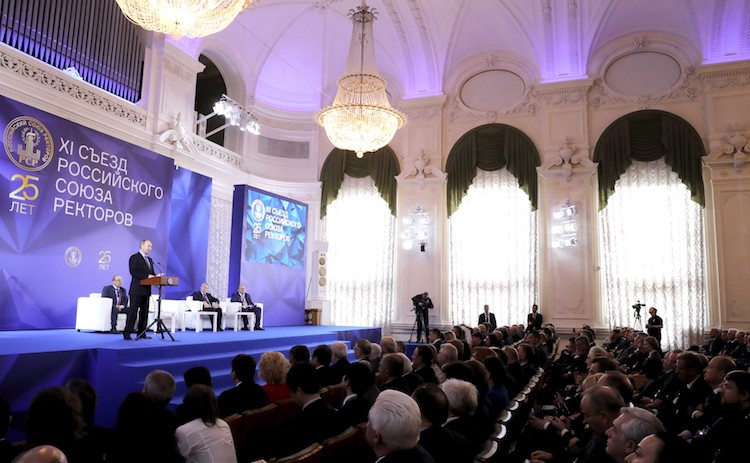By Kester Kenn Klomegah
MOSCOW (IDN) – The Russian Ministry of Higher Education, the Russian Rectors’ Association and Education NGOs have been on their heels to realize important tasks given them by President Vladimir Putin. As an integral part of educational reforms, he has stressed the importance of enormous initiatives and modernization efforts.
He also pointed to the growing contribution of universities to research, new technology development, and implementing and training qualified personnel for projects at various levels, ranging from national to regional and municipal initiatives.
“We see that Russian universities can actually deliver, which shows that change is underway, and we must make sure that this trend gains momentum. Let me reiterate that universities and other higher education institutions across the country are expected to evolve into hubs of technology and human development, and serve as economic development drivers for economic sectors and regions,” Putin said.
Addressing a plenary meeting of the Russian Rectors’ Association at Peter the Great St Petersburg State Polytechnic University in April 2018, Putin further emphasised that a really good institution of higher education not only gives knowledge and skills, trains professionals who will be able to set the intellectual, scientific and technological agenda for the development of the entire country, “but also offers its education as an exportable product”.
“We are setting some very difficult tasks for Russian universities and expect they will be improving their performance and competitiveness, getting rid of outdated and moribund approaches and future-oriented. Only this way we can achieve a breakthrough in national development and raise the international rating among comity of world universities,” the Russian leader added.
Viktor Sadovnichy, Rector of Moscow State University and Chairman of Russian Rectors’ Association, a national public organization that unites more than 700 heads of higher education institutions, argued that education and demography are inter-connected, from the global demography point of view the distribution of universities across the planet is not right.
“The population in the highly developed countries of North America and Europe is ageing fast whereas the young population in the developing countries of Asia, Africa and Latin America is burgeoning and knowledge-hungry, but there are few universities there. This situation favours the export of our education, which has great potential. We have huge potential,” Sadovnichy said.
The system of higher education has always been and remains the powerful intellectual resource, generating new ideas and – this is what it was designed for, of course – trains staff for all areas of life in Russia and abroad. This serves as an investment into the achievement of the main target – training professionals that are in demand on the labour market, explained Sadovnichy.
The Rossiyskaya Gazeta, a widely circulated Russian daily newspaper, reported recently that 40 leading Russian universities, including Moscow State University and St. Petersburg State Polytechnic University, would need about 6,000 lecturers from abroad. The number of foreign teachers in the country’s universities is currently significantly small and consequently does not help boast the institutions prestige.
As far back as in April 2011, a new law that passed by both houses of parliament allows the employment of foreign experts as teachers at Russian colleges and universities. The law is an attempt to boost scientific, research and cultural exchanges and turn the country into a research hub and a centre of academic excellence. Still school authorities, in practice, are still hesitant in hiring foreign specialists.
Russia’s Ministry of Higher Education has already launched a large-scale educational campaign abroad targeting to recruit about 150,000 foreign students annually into its educational institutions across the Russian Federation. The program, which seeks to boost the popularity and improve the position of Russian universities international ratings, will be implemented until 2025.
According to the Head of Fellowship of International Youth and Civil Organization, Mahomed Aliyev, foreign students studying in Russian universities have a number of advantages. Now foreign students, by law, have the right to employment and can extend their visas at the request of the university without leaving Russia.
These questions relating to student employment and especially simplifying the procedures of issuing educational visas for foreign students were earlier discussed by the State Duma deputies and with Ministry of Higher Education and Ministry of Foreign Affairs.
Besides, foreign students can learn their rights and obligations while staying in the country, which are currently available in English, French, Spanish and Arabic, and it has been published on the website. The main purpose of the website, study in Russia, is to attract foreign students to study at Russian Universities.
In an IDN interview, the representative of Federal Migration Service, Alexander Tolstobrov, has also informed that his department has been supporting foreign students from different countries under the new legislative amendment and has since taken adequate measures to make the Russian higher education system more accessible for foreigners.
“Nevertheless, the Russian government is aware of the importance of international recognition of the Russian education system. Russian universities inculcate diversified cultural tolerance, take advantage of multiculturalism and cosmopolitanism – aspects of modern life – which are necessary prerequisites for any success in the now globalized world,” he maintained.
Experts from the Center for Strategic Research have remarked that the percentage of Russian Universities on the world market is quite considerably low. Due to this, there’s a need to develop Russian education export opportunities. All these measures will lead to enhanced interest in Russian education among foreigners.
Currently, U.S. and U.K. universities are the most highly rated and popular for foreign nationals, so also France and Germany. China’s Peking University took the 25th place. Moscow State University, established by Mikhail Lomonosov, and St. Petersburg State Polytechnic University came 23rd and 61st position respectively among the global university rating, according Rating Review. [IDN-InDepthNews – 10 May 2019]
Photo: Putin addressing the plenary meeting of the Congress of the Russian Rectors’ Union. Credit: Mikhail Metzel.
IDN is flagship agency of the International Press Syndicate.
facebook.com/IDN.GoingDeeper – twitter.com/InDepthNews
Send your comment: comment@indepthnews.colo.ba.be
Subscribe to IDN Newsletter: newsletter@indepthnews.colo.ba.be

